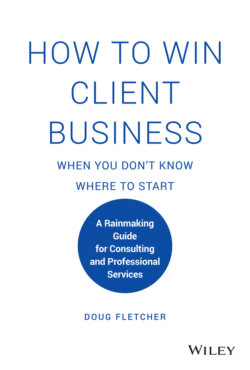Читать книгу How to Win Client Business When You Don't Know Where to Start - Tom McMakin, Doug Fletcher - Страница 22
The Importance of Doing Great Work and Repeat Clients
ОглавлениеIt is hard to have a meaningful discussion about winning client business without discussing two very important topics:
1 The Importance of Doing Great Work
2 The Value of Repeat Clients
Doing great work is vital to winning client business. The two can't be separated. If we don't do good work, we just won't be around for long.
But this is not a book on how to do great work; this is a book about how to get the work. My focus is not meant in any way to diminish the importance of being really good at your craft. It's just that most of us are already skilled at doing great work. Universities, professional organizations, continuing education, and firm training all contribute to the ongoing emphasis on how to do our jobs well.
There's a distinct difference, though, between the doin’ and the gettin’. Frankly, it's harder to find professionals who are skilled at getting the work than doing the work; hence the high‐attrition rate at the partner juncture and the relative scarcity of successful solo‐practitioners.
The second topic, the value of repeat clients, is also incredibly important. This was the case in my consulting firm. When we sold North Star Consulting Group in 2014, we had a considerable client base that had been with us since we opened our doors in 1999. Without these great, long‐term clients, our firm would not have been successful.
In many professions – if not most – consistent, repeat business from existing clients is the backbone of the firm. For many professionals, repeat clients represent 80% of their business. Without repeat business, the time commitment of finding new clients would consume nearly all of our week and there wouldn't be time for much else.
It's been well‐documented that repeat clients are in many cases the most profitable. Over time, loyal clients often base their decision to work with us less on cost‐sensitivity and more on the quality of the service and relationship. And there is less of a learning curve on our end in serving them well. Additionally, without doing great work for our existing clients, referrals to new client business would be few and far between.
Although these two topics are important, they are not the focus of this book. My passion lies in how to win new business, clients we have never served before. Not because it is more important than doing great work, but because winning new clients is the primary criterion of those on the partner track and the newly self‐employed. And, if we've already made partner, new client business will bring growth and vibrancy to our baseline practice. Without learning to generate new client work, all businesses will eventually plateau or decline.
